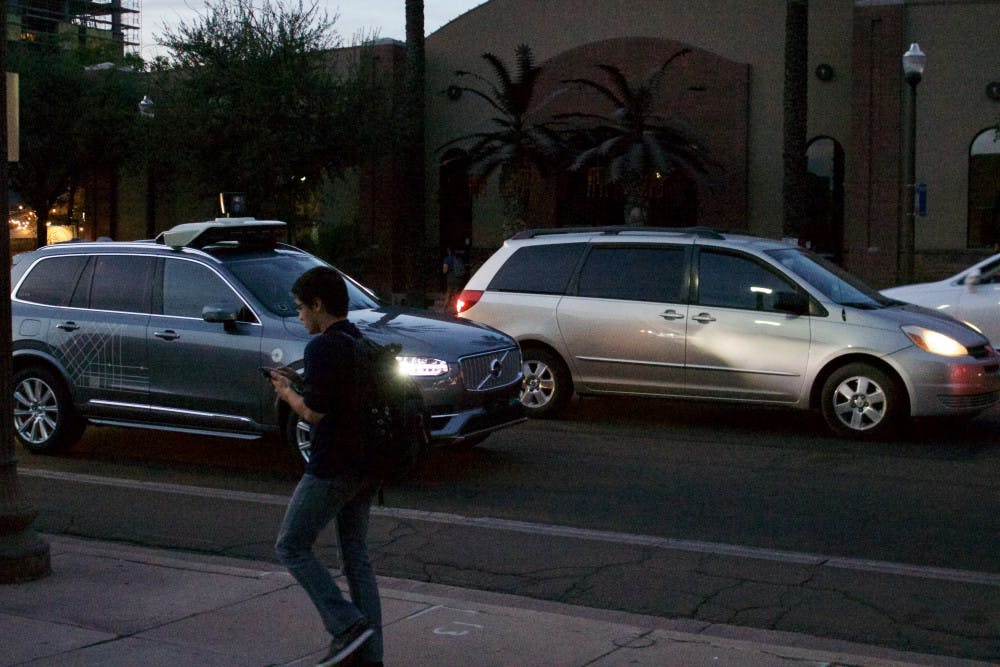Many in Tempe have likely seen the Volvo SUVs with automated driving technology up top and the Uber label on its side doors.
The spinning units are part of Uber's effort to blaze a new trail for the autonomous vehicle market and push for new boundaries, as well as regulations.
This is thanks in part to Arizona politicians welcoming Uber's experiment after it was denied in California for lack of required permits. Two people ride in each car, one in case the automated driver system were to fail, and the other to record trips.
Kathleen Thelen, a professor of political science at MIT, spoke on Oct. 26 at ASU's Schwada Classroom Office Building. Her research on the economy of Uber for the past few years has opened a window into the new sharing economy.
Since its founding in 2009, Uber has reached 700 cities around the globe in more than 80 countries. In her lecture, Thelen focused on the economies of the United States, Germany, and Sweden and their reactions to Uber.
"If you're a comparativist like I am, who compares things across countries, this is about as close to – as political scientists are going to get – a natural experiment," said Thelen in her lecture to ASU students. Because of this, governments and local municipalities have raced to find regulation, or accommodation, fitting for the internet-based transportation app.
Thelen broke the issues Uber faces into five categories: competition with the local market, labor issues, social benefit policies, taxation and consumer safety.
The U.S. press has primarily focused on competition, employability, and consumer safety, Thelen said. She said it was portrayed as "enhancing" competition in an overly regulated field.
In February 2017, 200 of Uber's autonomous vehicles began circling the streets of Tempe and Pittsburgh, Stephanie Sedlak, a spokeswoman for Uber, said.
There is no timeline for Uber's stay in Tempe, but the ultimate goal is to have autonomous vehicles on the road without the need for any operator in the driver's seat, Sedlak said.
Uber's self-driving cars are responsible for more than 30,000 passenger trips across more than 1,000,000 miles. However, the Uber engineers in the driver's seat still have to make corrections to the path on a regular basis, according to Recode.net.
Arizona Gov. Doug Ducey signed an executive order giving Uber the right to test its self-driving cars in the state as well as creating a committee representing the state Department of Transportation, the Department of Public Safety and professors from the University of Arizona to safely regulate Uber's driverless cars.
"Tempe is part of the regional effort to move this technology forward and we’re really a perfect place for it," said Nikki Ripley, a public information officer for the city of Tempe. "We have a busy downtown with real-life scenarios with cars, pedestrians and bicyclists."
In many cities and countries, the company employs an ask-for-forgiveness-not-permission policy in regards to permitting, Thelen said.
Thelen said one way the company is able to get by with this is mobilizing its customers to express their feelings about legislation restricting Uber.
In New York, Uber launched a separate app that automatically sends an email to the mayor's office if a customer was unsatisfied with the time it took for a taxi versus an Uber. This successfully ended legislation that would have capped the number of Ubers in New York City, Thelen said.
"We see (autonomous vehicles) as the future of driving," Sedlak said.
Correction: This article originally stated that there were 200 autonomous Ubers in Tempe alone, there are 200 in Tempe and Pittsburgh combined.
Reach the reporter at cbudnies@asu.edu or follow @ChaseHBudnies on Twitter.
Like The State Press on Facebook and follow @statepress on Twitter.




